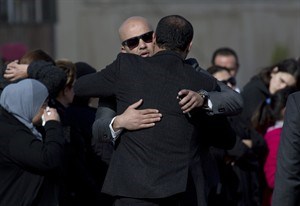
Relatives of the late Palestinian cabinet member Ziad Abu Ain mourn during his funeral procession at the Palestinian Authority headquarters in the West Bank city of Ramallah, Thursday, Dec. 11, 2014. Israeli and Palestinian pathologists disagreed Thursday on whether a blow to the body or a bad heart was the main cause of death of the Palestinian Cabinet minister who collapsed shortly after scuffling with Israeli troops during a West Bank protest. (AP Photo/Nasser Nasser)
Republished December 11, 2014 - 1:22 PM
Original Publication Date December 10, 2014 - 3:10 AM
RAMALLAH, Palestinian Territories - The Palestinian government blamed Israel on Thursday for the sudden death of a Cabinet minister, citing preliminary autopsy results — disputed by Israeli pathologists — that he died from a blow during a confrontation with Israeli troops.
The contradictory interpretations of a joint autopsy on the minister, Ziad Abu Ain, threatened to further inflame tensions between Israel and the Palestinian Authority, amid demands from an angry Palestinian public to halt security co-operation with Israeli forces in the West Bank.
Pathologists disagreed on the main cause of death, with Palestinian doctors saying the 55-year-old Cabinet minister died from a blow to the body and Israeli doctors saying he had a heart attack.
"The results of the autopsy show that the ones who killed the martyr Ziad Abu Ain are the Israeli occupying forces," Palestinian Health Minister Jawad Awad said.
Despite the findings, Palestinian President Mahmoud Abbas appeared in no rush to comply with demands to halt security co-ordination with Israeli forces. The policy is highly unpopular, particularly at times of heightened tensions. However, the alliance of Israeli and Palestinian security forces against a shared foe, the Islamic militant Hamas, has helped insure Abbas' continued rule in the autonomous areas of the West Bank.
Abbas has also been leery of turning a strained relationship with Israel into a confrontational one, despite repeated warnings that he would seek international sanctions against Israel in the absence of meaningful talks on Palestinian statehood.
Abu Ain died Wednesday following a confrontation between Palestinian protesters and Israeli soldiers that included pushing and shoving. At one point, a member of Israel's paramilitary border police grabbed Abu Ain by the throat and pushed him. Troops also fired tear gas during the clashes.
Several minutes after the scuffle, Abu Ain collapsed, clutching his heart. He received first aid and was evacuated, but died en route to a hospital. An autopsy was conducted later Wednesday by Palestinian, Jordanian and Israeli pathologists.
Citing preliminary findings, Palestinian pathologist Dr. Saber Aloul, said Thursday that "the cause of death was a blow, and not natural causes."
He said some of Abu Ain's front teeth broke off and dropped to the back of his mouth as a result of trauma to his face. He also noted bruises on both sides of the neck, the back of the tongue and the windpipe, which he said appeared to be caused by force.
The Palestinian pathologist also cited bleeding in the coronary artery and said it was a result of "anguish and stress."
Dr. Chen Kugel, the chief Israeli pathologist, said Abu Ain died of a heart attack.
"The cause of death can definitely be determined," he told Israel TV's Channel 10. "He died as a result of bleeding ... in an artery that supplies blood to the heart, or in simple terms, a heart attack."
He said there were signs the blockage in the artery was caused by stress, but added: "If this was a healthy person, (the incident Wednesday) wouldn't have caused anything. But he wasn't a healthy person. He had a sick heart with arteries that were 80 per cent blocked."
Kugel said he found "very minor bruising" on the neck and elsewhere.
Awad said the Palestinian and Jordanian pathologists signed the findings, but that the Israeli doctors held off on a signature. The Israeli health ministry said the Israeli doctors didn't sign because it was a preliminary, not a final report.
Abu Ain was buried Thursday in Ramallah, after a funeral procession accompanied by thunderous gunfire from mourners shooting in the air.
The ceremony began at Abbas' headquarters, where thousands of mourners gathered for prayers over the minister's coffin, draped in a Palestinian flag. From there, a smaller crowd accompanied the coffin as it was transported in the back of a pickup truck to a nearby cemetery.
Israel sent troop reinforcements to the West Bank on Thursday, anticipating Palestinian protests. However, there were only reports of small clashes between troops and Palestinian stone throwers.
Another gauge of the Palestinian mood was expected Friday, after noon prayers in mosques, typically a time of protests. Hamas called for a rally Friday in the West Bank city of Hebron to mark the 27th anniversary of its founding.
Abbas, meanwhile, was to meet with senior officials from the PLO and Fatah on Sunday to discuss a possible response to Abu Ain's death.
Six options are on the table, including measures Abbas has announced previously, such as presenting a draft resolution to the U.N. Security Council that would set a November 2016 deadline for ending Israel's occupation. Halting security co-ordination was also among the options, officials said.
A member of Abbas' Fatah movement, Abu Ain was the minister in charge of organizing protests against Israeli settlements and the West Bank separation barrier.
He was arrested in the United States in 1979 and extradited to Israel two years later. In Israel, he was sentenced to life in prison for involvement in a bomb plot that killed two Israelis. He was released in a 1985 prisoner swap.
News from © The Associated Press, 2014